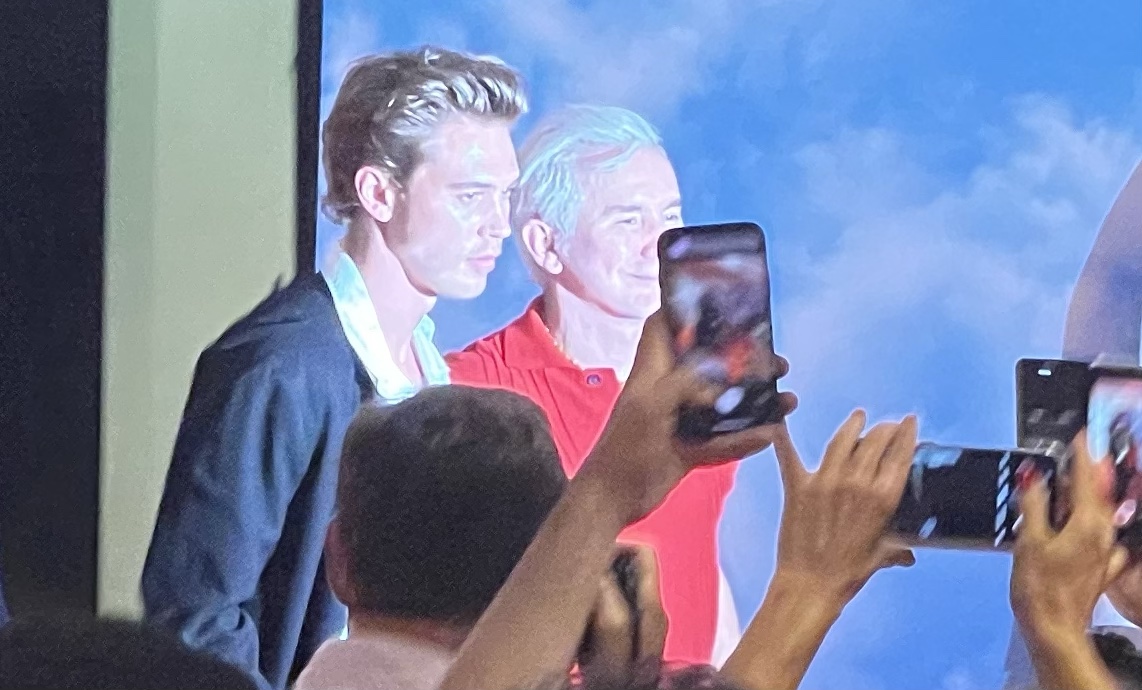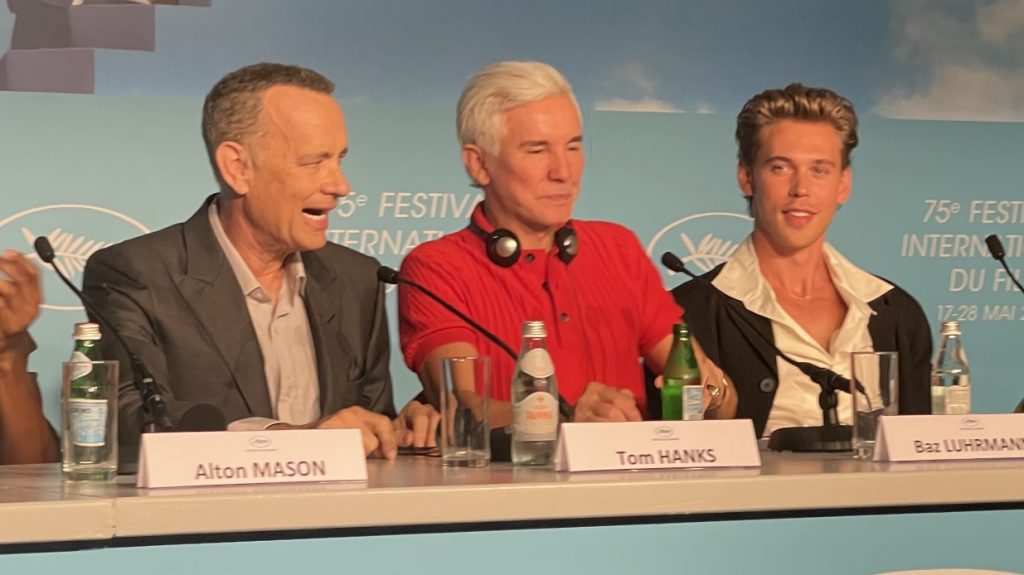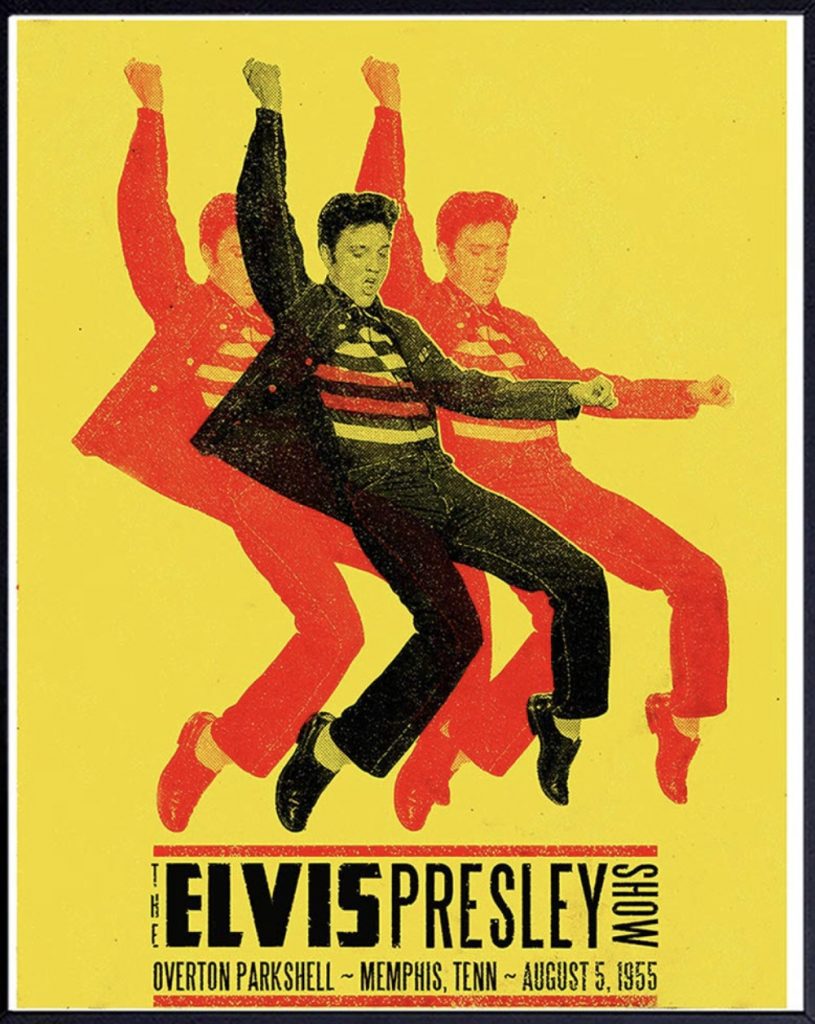“That ready-to-fly moment is happening for Austin, and I know because we went to the Met Gala together,” Baz Luhrmann said. “As soon as we got on the red carpet, there was keening from fans. Not just screaming — keening. I’ve only heard that sound once before. I was with a young actor whose name was Leo.” He was referring to a pre-Titanic DiCaprio, then quivering hearts in Luhrmann’s Romeo + Juliet.” — from Brooks Barnes‘ 5.25 N.Y. Times profile of Elvis star Austin Butler.


The top video tells us that Col. Tom Parker, Elvis Presley‘s manager between 1955 and the early ’70s, spoke with a soft country accent. But for his portrayal of Parker in Elvis, Tom Hanks speaks with an odd accent that I’ve never heard before — half American, half European (Dutch?) and maybe a little touch of space alien.
In one or more of the Elvis biographies, a story about the fee negotiation for one of Presley’s first big TV appearances in ’56 (possibly The Ed Sullivan Show) is reported. The Sullivan show producer offered whatever the standard compensation was back then for a newcomer. Parker replied, “Well, that’s okay for me but what about the boy?” In an Elvis negotiation scene about what Presley will be paid for his Las Vegas Hilton appearance, the conversation is reversed. A Hilton rep mentions a sizable fee and Parker replies, “Well, that sounds about right for Elvis, but what are you paying me?”
[11:25 am] Elvis isn’t quite as bad as I feared, but several sections are punishing to sit through. It’s a flashy, pushy, often exhausting carnival sideshow, very primary and primitive, clearly made for the ADD peanut gallery…a fairly blunt tool.
Baz Luhrmann understands the whole Elvis Presley story chapter-and-verse, and the film covers every last important or noteworthy story point, but God, what a crushing, staggering drag to hang out with fatsuit Tom Hanks (as Colonel Tom Parker) for 159 minutes.
Using Parker’s perspective as a framing device was an understandable decision, I guess, but the Hanks presence seems to drain so much of the film’s potential. It kills so much of the music, the invention, the potential fun of it, the all of it. At times it feels as the film is mainly about Parker with Elvis as a prominent supporting character.


Just as Parker became more and more of a pestilence (a constantly interrupting or stifling figure) in Elvis’s life and career, Hanks’ performance becomes more and more unwelcome and deflating from an audience perspective.
Ladies and gentleman, the villain of Elvis’s life! The guy who stifled and nearly smothered Elvis’s career because Elvis was too complacent or blinded or drugged by the big money to see what a bloated, selfish, gambling-junkie, revenue vacuum cleaner Parker had become.
Austin Butler does a good workmanlike job in the title role. He apparently gave everything he had. As Owen Gleiberman has written, Butler looks less like Elvis than the young John Travolta mixed with Jason Priestley. But he worked it hard. Respect.
I adored the moment in which Elvis’s “Memphis mafia” (i.e., the principal parasites) is introduced as if part of a TV show opening-credits sequence. One of Baz’s best moments.
Sidenote: Luhrmann ends it with the famous Las Vegas “Unchained Melody” a capella performance with a sweating Elvis sitting down at the piano, etc.
Going by the online trailers, I’ve been noting all along that the film seems to avoid the “fat Elvis” period, but it doesn’t. Because the “Unchained Melody” sequence is TOTALLY FAT FAT WHITE JUMPSUIT ELVIS…fat, fat, dessicated, dessicated, FAT FAT HEART ATTACK SWEATING SWEATING FAT FAT DEAD. But such a soulful delivery of a song.
It doesn’t seem to be a Butler fatsuit thing as much as a Butler face-paste…footage of the real fat Elvis with the singing, sweating Butler digitally inserted.

 All Hail Tom White, Taciturn Hero of “Killers of the Flower Moon”
All Hail Tom White, Taciturn Hero of “Killers of the Flower Moon”Roughly two months ago a very early draft of Eric Roth‘s screenplay for Killers of the Flower Moon (dated 2.20.17,...
More » Dead-End Insanity of “Nomadland”
Dead-End Insanity of “Nomadland”Frances McDormand‘s Fern was strong but mule-stubborn and at the end of the day self-destructive, and this stunted psychology led...
More » Mia Farrow’s Best Performances?
Mia Farrow’s Best Performances?Can’t decide which performance is better, although I’ve always leaned toward Tina Vitale, her cynical New Jersey moll behind the...
More »

 Hedren’s 94th
Hedren’s 94thTwo days ago (1.19) a Facebook tribute congratulated Tippi Hedren for having reached her 94th year (blow out the candles!)...
More » Criminal Protagonists
Criminal ProtagonistsA friend suggested a list of the Ten Best American Crime Flicks of the ‘70s. By which he meant films...
More » “‘Moby-Dick’ on Horseback”
“‘Moby-Dick’ on Horseback”I’ve never been able to give myself over to Sam Peckinpah’s Major Dundee, a 1965 Civil War–era western, and I’ve...
More »


